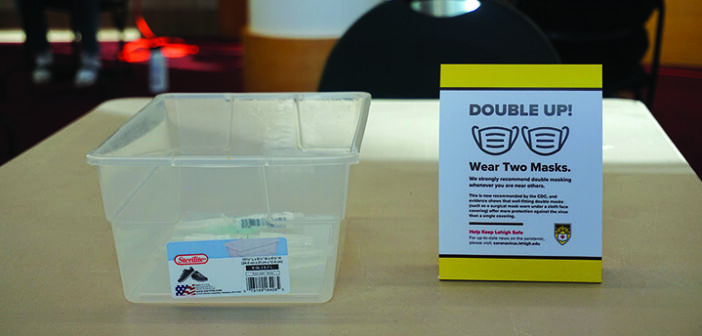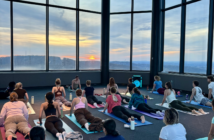Many Lehigh students are happy about the university’s new COVID-19 testing protocols amid the early case count spike, but some are worried it’s not enough to mitigate the spread.
Lehigh had planned on testing 100 percent of the student body for the first two weeks of the semester, but extended student-wide testing another week after a drastic increase in cases.
As of Feb. 21, there are 305 active cases among students living on- or off-campus.
While students are generally pleased with the increase in testing compared to the fall semester, there are mixed opinions on whether or not the current testing strategy is sufficient.
Anderson Bento, ‘22, said the arrival testing was a good starting point for the university.
“I think it’s definitely been good for the school because even though the results have been bad, it shows that they’re trying,” he said.
Surveillance testing, which has been taking place in Zoellner Arts Center, has been mostly well-received by students.
Dan Park, ‘24, said he thought the Zoellner setup was safe and efficient for all parties involved. Social distancing was maintained between everyone at all times and everything was sanitized after each student took their test, he said.
Bento said the QR code scan located at the entrance of the building makes it easy for students to fill out their information quickly and in a much more streamlined process.
But, Bento said even with the constant sanitizing, he thinks the general concept of students getting tested at the same location seems flawed.
“They’re making however many kids come in each day to the same building, touch the same things, and sit at the same ten tables,” Bento said. “There’s obviously a lot of overlap there.”
Park said he thinks Lehigh needs to be more vigilant about getting students to show up to Zoellner for their tests in the first place.
“I’d say they have to be a little more strict on actually making the kids take the tests,” Park said. “I know a couple guys that still haven’t signed up for one yet.”
Hetty McMillan, ‘22, said she thinks the testing system in Zoellner is much better than the fall structure — both in regard to the physical setup and the frequency of the testing.
McMillan said she was not pleased with how the university tested in fall 2020.
“Last semester’s testing was a complete joke,” McMillan said. “They tested us like twice, and as an athlete, we definitely should have gotten tested multiple times a week, or at least multiple times throughout the semester.”
Bento said testing students more frequently would go a long way in stopping the spread of the virus.
McMillan said it’s particularly frustrating as a runner to see her teammates trying to do the right thing, but still get infected by students who have not been following guidelines.
“I go to practice, come home, go to the grocery store on the weekend, that’s it,” McMillan said. “But it just goes to show, even people on my team doing that same thing are in quarantine right now, and it’s frustrating that people aren’t being respectful of the community guidelines.”
But, McMillan said she’s not sure if there’s anything more the university can do to control students behaving irresponsibly.
Park and Bento both said they think Lehigh is doing the best it can to stop the spread.
“There’s not a lot they could do to improve (the situation),” Park said. “I’m not quite sure there’s anything they could do to make it a safer place.”
Bento said he believes most of the COVID-19 cases are arising from events that are taking place off-campus and said it’s hard for the university to control individual behavior in more ways than what they’re already doing.
McMillan said she is frustrated by the COVID-19 response of both the Bethlehem and Lehigh University police departments.
“Their job is to protect the Bethlehem community,” McMillan said. “Right now, Lehigh is a huge threat to the spread of COVID in Bethlehem. There are residents not affiliated with the university being severely affected by students’ actions, and I feel like the Lehigh police and Bethlehem police are doing nothing about it.






Comment policy
Comments posted to The Brown and White website are reviewed by a moderator before being approved. Incendiary speech or harassing language, including comments targeted at individuals, may be deemed unacceptable and not published. Spam and other soliciting will also be declined.
The Brown and White also reserves the right to not publish entirely anonymous comments.
1 Comment
What silly sheep and dastardly wolves?
If two masks are better than one, then aren’t three betterer?